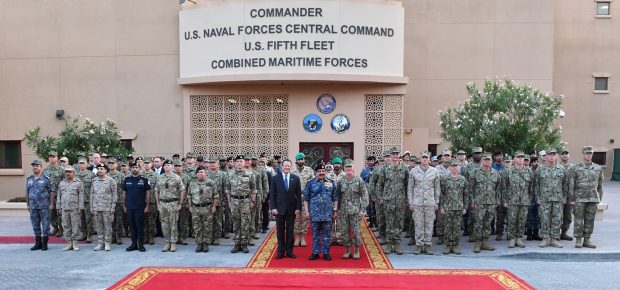Bahrain first Arab country to join Gulf maritime coalition

King Hamad during the visit to U.S. Naval Support Activity headquarters in Bahrain (BNA)
Manama: Bahrain, host to the U.S. Navy’s Fifth Fleet, has become the first Arab and Gulf country to announce officially that it would join a U.S.-led maritime coalition “to ensure freedom of navigation in the Gulf.”
King Hamad bin Isa Al Khalifa on Sunday confirmed during a meeting with visiting General Kenneth F. McKenzie, Commander of the US Central Command, “Bahrain’s participation in the joint effort to preserve the safety of international maritime navigation and secure international corridors for trade and energy in the region.”
On Monday, during visits to the Royal Bahrain Naval Force and to U.S. Naval Support Activity Headquarters in Manama, King Hamad stressed the “continued success in the coordination and cooperation initiatives between us, which reaffirms our sound security and defense directions, and is a source of satisfaction and pride in the vital and constructive role of our forces working together to enhance our security and defend our interests.”
“We also find in these efforts an honorable example of responsibility and professionalism in carrying out all tasks with determination and dedication. The most important of these is the duty to preserve the safety of maritime navigation and secure international corridors for trade and energy, the protection of which is a responsibility we all bear out of our duty to the stability of the region and the world as a whole,” he said.
In such critical times, the U.S. commitment to the security of the region, and keenness to work collectively with its countries, are foundation stones for strong relations, he added.
“From this foundation, we work to intensify all aspects of cooperation and coordination, through continuous consultations on developing action strategies in light of the challenges and threats facing the region and its security, so as to ensure that all parties are obliged to respect the laws and norms governing relations of good neighborliness, mutual respect for sovereignty and independence of states, and non-interference in internal affairs.”
The U.S. Central Command welcomed Bahrain’s decision to join the international maritime security construct.
“I appreciate His Majesty King Hamad bin Isa Al-Khalifa’s decision to join the United Kingdom and the United States in taking an active role in preserving the freedom of navigation, promoting maritime security and de-escalating regional tensions,” General Kenneth F. McKenzie, Jr., Commander, U.S. Central Command, said in a statement.
“The free flow of commerce throughout international waterways is a linchpin of the global economy, and we appreciate the Kingdom of Bahrain’s leadership and support in preventing aggression from curtailing that freedom. Threats to the free flow of commerce are an international problem requiring an international solution, and we are pleased that the Kingdom of Bahrain will be a part of that solution.”
The US is looking forward to working with other nations to secure freedom of navigation, he added.
Last month, the Central Command said it was developing “a multinational maritime effort, Operation Sentinel, to increase surveillance of, and security in, key waterways in the Middle East to ensure freedom of navigation in light of recent events in the Arabian Gulf region.”
“The goal of Operation Sentinel is to promote maritime stability, ensure safe passage, and de-escalate tensions in international waters throughout the Arabian Gulf, Strait of Hormuz, the Bab el-Mandeb Strait (BAM) and the Gulf of Oman,” the Central Command said.
“This maritime security framework will enable nations to provide escort to their flagged vessels while taking advantage of the cooperation of participating nations for coordination and enhanced maritime domain awareness and surveillance.”
Stressing that the United States has committed to supporting the initiative, the Central Command said that contributions and leadership from regional and international partners would be required to succeed.
U.S. officials have been coordinating on Operation Sentinel with allies and partners in Europe, Asia, and the Middle East. Details touched on the nature of deployments, ports for naval presence and the mandate.
The United Kingdom has already joined the U.S. effort and beefed up its presence in the Gulf.
According to reports in Seoul, South Korea would also sign on to Operation Sentinel and a Korean destroyer currently operating off Somalia would be deployed in the Gulf.



















































